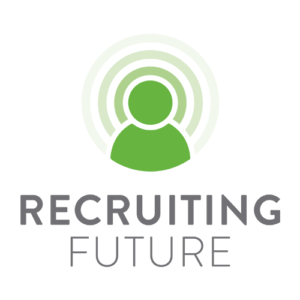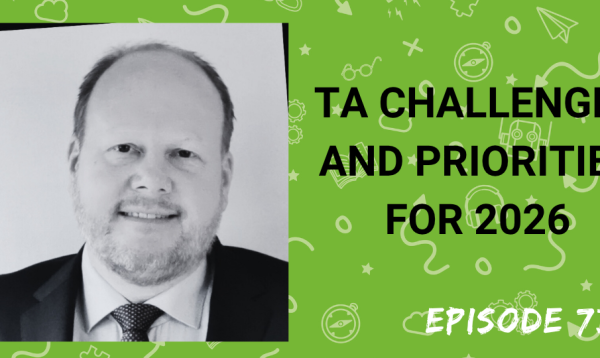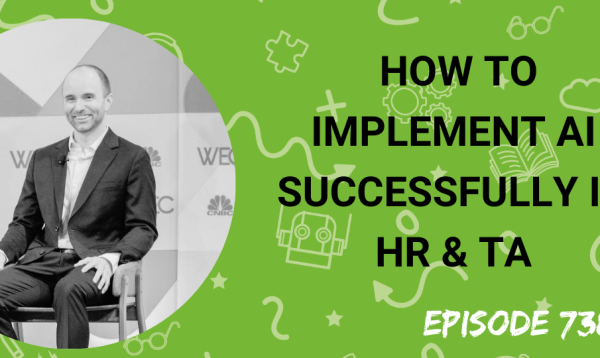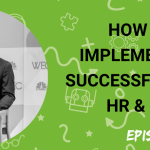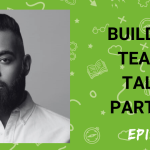The most consistent thing that I’m currently hearing from Talent Acquisition professionals is that everything is changing. Whether that is the availability and expectations of talent, technology, budgets, resources or communication preferences it is clear that nothing is constant anymore. But with so much to achieve and so little time to do it, what do Talent Acquisition leaders need to prioritise in order to ensure success.
My guest this week is the highly respected industry consultant Elaine Orler. Elaine is CEO of Talent Function, Co-Founder of the Talent Board and Co-Chair of The Recruiting Trends and Talent Technology Conference.
In the interview we discuss:
• The significant changes Talent Acquisition is experiencing
• Strategic versus transactional thinking
• How companies are getting competitive advantage
• What makes for a winning candidate experience
• First and second generation recruiting technology
Elaine also gives us a preview of The Recruiting Trends and Talent Technology Conference which is being held in Palm Beach in November
Subscribe to this podcast in iTunes
Transcript:
Matt Alder [00:00:00]:
Support for this podcast comes from Avature ats, an applicant tracking system that redefines user experience for candidates, recruiters and hiring managers. Just listen to one of the many ways in which L’Oreal USA has improved their hiring process with Avature, as told by Edward Dias, Director of Recruitment, Intelligence and Innovation.
Edward Dias [00:00:25]:
Since we’ve been using Avature ATS globally, we have been able to massively improve our communication rate with candidates during and following their application. Before, over a million people worldwide would never get contacted, but with the smart automation and flexible processes, we’ve been able to change that and that’s been a huge achievement.
Matt Alder [00:00:48]:
Visit avature.net that’s a V A T U R E.net to learn why global market leaders like L’Oreal choose Avature to extend the candidate experience. From shoulder taps to first day.
Matt Alder [00:01:23]:
Hi, this is Matt Alder. Welcome to episode 106 of the Recruiting Future podcast. The most consistent thing I hear from talent acquisition professionals is that these days everything is always changing. Whether it’s availability and expectations of talent, technology, budgets, resources or even communication preferences, nothing is constant anymore and many long held talent acquisition truisms are now out of date. So, with so much to achieve and so little time to do it in, what do talent acquisition leaders need to prioritize to ensure success? My guest this week is industry consultant Elaine Orler. In the interview, Elaine shares some brilliant insights about talent acquisition strategy, technology and the candidate experience.
Matt Alder [00:02:20]:
Hi Elaine and welcome to the podcast.
Elaine Orler [00:02:22]:
Hi, I’m excited to be here. Thanks Matt.
Matt Alder [00:02:25]:
So could you introduce yourself and tell a little bit about who you are and what you do?
Elaine Orler [00:02:30]:
Absolutely. Name is Elaine Orler and I founded a consulting firm called Talent Function nine years ago. I’ve been focused specifically and squarely on the talent acquisition equation and getting the people, process and technology right. Prior to founding Talent Function, I worked for various other consulting firms and started my career in HR as a recruiter in a startup in in California called Qualcomm, which is no longer a startup. It’s quite a big company now. Six years ago I also co founded the Talent Board which is the nonprofit entity behind the Candidate Experience Awards. A passion of mine to see that interaction and relationship happen with the candidates and recruiters in such a way that everybody leaves at least neutral and hopefully positive. But anything is better than negative. And more recently have taken on the co chair position with LRP for the Recruiting trends MTA Tech conference. So excited about Talent Acquisition is pretty much my. My lifeblood on top of my marriage and my two amazing kids.
Matt Alder [00:03:35]:
Fantastic. And I want to sort of talk more about the candidate experience and the conferences are sort of a little bit later in the conversation. But really just to start off with, I’d be really interested in your perspective on about how Talent Acquisition is changing and really kind of how it’s changed over the last few years and what you’re kind of seeing now sort of going from 2017 towards 2018.
Elaine Orler [00:04:02]:
Great questions. And I think we’ve had different moments in the last 20 years where there have been casual changes and then there’s been some pretty hard right or left turns. And I think we’re moving into a probably what I would call a hard right turn on Talent acquisition. Coming into 2018 and 2019, there’s so much pressure to do more with less continuing us. On top of that, the skill shortage that is just such a hard mix for many organizations to tap into where that talent really is and then throw on top of that the technology evolutions that are happening on a day in and day out basis. I get to opportunity to work with companies that are saying, okay, push all that aside and let’s just go back to what is it we’re really trying to accomplish. And I think Talent Acquisition’s number one mission to every corporation they work for is competitive differentiation and competitive advantage. If we don’t get the best talent, our company doesn’t win. And so going back to those fundamentals or some of the things I’m seeing organizations do, to say it’s not about how many products we have, it’s not about how many steps in the process we do. It’s about can we engage with the best talent, get that best talent into our organization so that we can have competitive advantage over the rest of market. And as Talent Acquisition thinks that way versus the transactions or the tracking steps, or if I hear one more thing about time to fill as the most important variable in Talent Acquisition, it’s not, but those are the things I get to talk about on a day in and day out basis.
Matt Alder [00:05:40]:
Very, very interesting. And I think the skill shortage thing is, you know, it’s kind of particularly relevant because it seems to be a global problem for, you know, for a number of different reasons. You mentioned competitive differentiation. What are you seeing people do to. To, to achieve that? What, you know, what’s kind of, what’s kind of working for people at the moment?
Elaine Orler [00:06:04]:
Great question. I think for me, there’s two things I see within the organization and then I see how they’re delivering that difference. And the first is it’s the mindset within talent acquisition. Understanding that and holding onto the mindset that talent is the only competitive differentiation one company A has from company B. Products can be recreated. We can borrow them, we can license them, technology can be used the same way or differently. So the only thing that’s really left that provides that X factor to organizations is the type of talent they’re able to acquire and retain within their business. So when I see organizations that see that as their cornerstone to how they’re delivering recruiting, the delivery model is also radically different because that’s where candidate care and relationships become foremost. The most important part, because this person may not be the best person for this job right now, but if they meet all the other criteria, you don’t want to bug them off so that they aren’t interested in the next job you might have two weeks from now. So there’s a difference in how the process is delivered to drive a higher quality experience for everybody involved. So that’s probably one of the biggest things I see in the differentiation. But with the global skill shortage and we talked about organizations are grasping at are these the absolute skills we need? Should we not be developing more skills going forward? I’m hearing of more and more programs where organizations are going into the high schools and the secondary schools, et cetera, to start to stimulate thoughts around some of these other degree programs before they even get to college and universities. Because if we don’t start getting people into this kind of discipline or mindset, the skill shortage is going to become even worse.
Matt Alder [00:08:03]:
That’s really interesting and I’ve got a couple of clients that I work with who are doing that at the moment, particularly around science subjects and engineering subjects and that kind of stuff. It probably seems like a good point to start talking a little bit more about the candidate experience, as it was kind of sort of central to what you were kind of observing there. Could you tell tell us a little bit about what you do in this space and what you’ve learned about the candidate experience in the last few years?
Elaine Orler [00:08:35]:
Oh, it’s a fascinating topic. When we launched the awards several years ago, the concept and the premise has always been put something out there that companies can strive to receive as an award versus continuing to complain about how bad it is. And what we’ve seen is organizations really step up. I’m excited about this year’s winners that just got announced, but some of the discipline and the value they put into that interaction and the measurements that they’re putting into that interaction, just even self measuring how the candidate was treated. Expectations, called candidate care specialists are new titles I see on a regular basis for jobs within the recruiting space. But I think the biggest thing that I’ve learned and taken away in the last three years on the data is it’s a global initiative. What a candidate expects in North America versus Europe versus Asia, PAC or even individual countries is actually not that different. All candidates just want to be treated with respect. The global data that we have, even from Last year’s data, 228,000 survey responses across I think 40 some plus countries and seven languages. It all comes back to the same thing. Tell me where I am in the process, tell me if I’ve got a chance and if I don’t, be honest with me so that I can move on and look for another job. And I’m not sitting here hopefully waiting and anticipating that I’m going to get the opportunity to be let down later. And these basic fundamental in her interaction in relation to principles are so prevalent globally. And to see organizations really stepping up to say, communicate how they’re going to tell a candidate they’re not right for that position but right for the company down the road, it’s a balancing act. But we’re getting better, we’re getting much better at the communication. And I think the other thing that I’m seeing evolve incredibly well is we’re getting better at using technology where it needs to be used in the right amount of information. I’m seeing less and less of the 45 minute application process, which I couldn’t be any more happy about because asking a candidate to invest 45 minutes into telling you everything there is to know about them in your format so that you can give them six seconds of a review and rejection I think is just wrong. So I’m seeing less and less of that and I’m excited about that change.
Matt Alder [00:11:05]:
Well, that’s excellent news because I couldn’t agree with you more there. Well, what I find interesting about the candidate experience is that most of the employers that I speak to have a kind of a recognition and a willingness that it’s something, something they need to improve. But, but many of them, many of them don’t. So from the kind of the, the companies that you kind of see winning the awards, what’s that, what’s the difference with the companies who actually go out and make a difference to their candidate experience? Because it’s obviously obvious that a lot of Companies want to do it, but don’t necessarily, you know, execute on actually doing it. So what makes a winner in this space?
Elaine Orler [00:11:48]:
A great question. The research from this year’s data will come out end of year early next year. But even just digging into the research from the last three years, which we always keep available to anybody that wants it, the difference has really been where things get measured and what gets measured for performance. So if a recruiter is incentivized or measured by time to fill, how fast can I fill that position? Irregardless, of the other 10 candidates that were in the cycle that were probably good, but I don’t have time for them because I have to worry about getting this one through the door. There’s a behavioral trend that happens. But if they’re incentivized and their performance is measured by their overall experience, even candidate survey data manager survey data, how they’re creating this connection piece to happen. There’s a slight difference in time to fill, the difference between two to three days and time to fill. But quality of hire and quality of overall experience start to take more precedence. And those organizations tend to be the ones that are in the top echelon of these winners. A couple of them have just gone really full throttle at candidates are customers. Their relationship matters to us, and we’re going to treat them with the highest level of respect we can. Now, respect doesn’t mean they always get the job. It also doesn’t mean we give them false messages of hope. Respect means we tell them where they are in the process and we’re clear about our decisions and our process and we stay consistent. And those organizations are thriving in their experience and their candidate data proves it.
Matt Alder [00:13:27]:
You mentioned the role of technology in all of this. Could you sort of tell us a bit more about that? What types of technology are you seeing used and what’s working and what’s working well and what’s working well and what’s working not so well?
Elaine Orler [00:13:44]:
You know, technology has always been my candidate. Experience is a passion. I’ll call that my first career child. The second child’s been technology all along. Because I think technology in and of itself can be such an amazing enabler when implemented right. When the strategy is aligned with the technology and the technology aligned with the strategy, it sings quite well. And there can be a beauty in the way in which it can enable a recruiter to be more successful. Unfortunately, over the last 10, 15 years, we’ve been inundated with point solutions and product solutions that are solving for myopic and Niche pieces that need to be solved for. But today, recruiters are inundated with anywhere from five to 30 different products that they have to touch just to get a hire done. And as I will talk with organizations and just start inventorying the number of logins they have to have or the number of process steps they have to repeat between product A and product B and product all the way to Z. It’s such a waste of time and energy. So today I’d say technology is a jumbled mess of wires that probably need to be reconnected in such a way that makes for a stronger current of information. On top of that, the new technology that’s coming out, which is much more intuitive, which I would have to say I’m much more excited about, is actually now taking on the transactions so that recruiters can be more proactive and interactive in their relationships. First generation recruiting technology was all transactions. And I think we’re finally getting into this true next generation of technology which is creating a better conversation and creating a better interaction. Now, how fast organizations can adopt the new technology and replace the old. We’re going to be in that cycle for a couple more years.
Matt Alder [00:15:41]:
Yes, absolutely. I couldn’t agree more. Is this new technology, I mean, there are all kinds of sort of labels that are flying around, around automation and artificial intelligence and all kinds of arguments about technically, what’s what and how does it work. But you know, what are you really seeing going on? What, what aspects of IT are the most impressive for you?
Elaine Orler [00:16:03]:
All of that for sure. I think what I look at in technology today is where is the solution helping me to be a stronger recruiter, stronger talent acquisition professional, stronger talent advisor. I don’t, I’m not looking at technology that’s going to replace me, but I am looking for technology that will make me smarter and better at what I do. So when I think of things like that, I’m thinking of products that are the mindset of taking on a transaction or activity, the simple step of knowing if this person’s moved to resume review, what are the next actions that should be happening and can the system interpret that these two things should happen. And start a scheduling component as an example, anything that simplifies the transactions so that they’re done through automation versus me having to go in and do them over and over again. But the advanced technology I’m keeping an eye on right now are really the ones that are saying that are drawing correlations to past performance to help me predict how I’m going to perform future. When I create a new requisition and publish that job. I want to know what the competitive landscape is. I don’t want to have to go do all the deep research on who else is published. There’s a product that will serve up to me. There’s 10 other jobs with similar titles and descriptions. They’ve been published for these number of days in that area. And by the way, the talent community and pools that are coming out of those universities and the people in jobs today that have been filled in the last year are this. So I now have a better idea of how competitive it’s going to be for me to recruit in that space and I might start to shift or change my strategy to be more effective. That kind of predictive tool, that kind of look back model on what we’ve done in the past as a business and those relationships to me are some of the most valuable tools today in recruiting. On top of those, I’m going to add that there’s a secondary piece of tools coming out where it’s really getting into a better mindset of putting better quality in front of the business. So whether it’s a better quality job description through making sure that it’s inclusive of all types of talent and not directly excluding people just based on the terms, all the way through the ability for managers to do a much stronger resume review without being blinded by their own bias. Those are things that I think are changing the way recruiting is being done today.
Matt Alder [00:18:31]:
Now that all brings us quite nicely on to talking about you being the co chair of the Recruiting Trends and Talent Technology Conference. Could you tell us a little bit about the philosophy behind that event and what you’re most looking forward to about the event this year?
Elaine Orler [00:18:47]:
Yes. Well, I’m super excited. I’ve had the privilege, truly it is a privilege for me to have been I’ve presented 14 consecutive years at the HR Technology Conference and this year will be my 15th consecutive year. And in that conference and in what LRP has been able to deliver through that conference and always been brokered a really high, high quality interaction between the technology providers and the companies that are looking for the next best solutions. And as that grows in a broad full HR aspect and landscape I think is brilliant. But my entire profession has always been around talent acquisition. So when LRP stepped up and acquired Recruiting Trends and launched the Talent Tech Conference last year as the first foray, it was like the blending of everything I’ve been passionate about for years. And so I was honored when they asked if I’d be interested in co chairing because I think the complexity of what’s happening in recruiting and talent acquisition with the technology that can enable it and brokering that conversation to be really strategic and really future thinking is what’s important to me. So the conference itself, that’s our end goal. I want to be able to create this conference in such a way that the attendees that are there and the practitioners, the solution providers, the consultants that all attend are having a higher quality conversation around just talent acquisition and what needs to be done to keep competitive advantage as we move our businesses forward. So that’s the goal and I’m excited to be diving in to try to try to make it happen.
Matt Alder [00:20:25]:
Fantastic.
Matt Alder [00:20:26]:
And could you tell us sort of where and when the conference is happening?
Elaine Orler [00:20:30]:
Sure.
Elaine Orler [00:20:30]:
This year we are doing a I call it the last conference of the year. It’s November 28th through 30th in Florida. My best description of this one for anybody else, anybody who lives north of Florida and I’m in San Diego. So we pretty much have that weather year round. Before you put on your snow boots, before you have to dig out that shovel, bring your sandals and your shorts for one last conference of the year because I think it is going to be a great stepping stone into what 2018 is going to bring. And the conversation at the conference will really be around what’s changing going forward. We’re going to the next conference is not going to be until 2019. We’re going to phase out 2018 and give ourselves some time to move the conference to a February schedule. And I’m excited about that as well because just gives us a little bit more time. And February, I can’t wait to announce where that’s going to be.
Matt Alder [00:21:23]:
Elaine, thank you very much for talking to me.
Elaine Orler [00:21:25]:
Thank you. Thanks for the conversation.
Matt Alder [00:21:28]:
My thanks to Elaine Orler. You can subscribe to this podcast on itunes, on Stitcher, or via your podcasting app of choice. This show also has its own dedicated app which you can download from your app store. Just search for recruiting future. You can find all the past episodes@www.rfpodcast.com on that site. You can also subscribe to the mailing list and find out more about working with me. Thanks very much for listening. There’s no show next week as I’m at the HR Technology Conference in Vegas. Please come and find me and say hello if you’re going to be there. Other than that, the podcast will be back in two weeks time.


